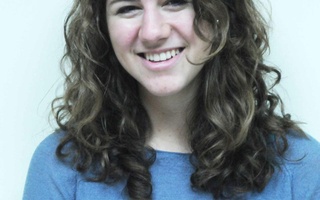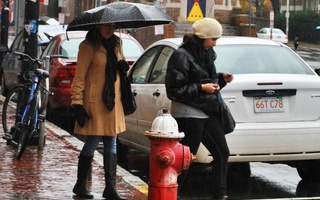Anton Chekhov’s play “Three Sisters” emerged in a nouveau-siècle Russia that had recently shed the shackles of feudalism to take its first steps into the world of modernity. The play revolves around Moscow, the city of hope and progress that reaches a Arcadia-like status for siblings Olga (Rachel A. Orol ’15), Masha (Rachel A. Gibian ’15), Irina (Chase Sui Wonders ’18) and Andrei (Matthew S. Krane ’15) Prozorov ever since they left it 11 years ago, when their late father, a military officer, was transferred to the provincial garrison town that becomes the play’s setting. Very conscious of their superior status and education, the three sisters and their brother wallow in an ennui only made bearable by the visits of officers from nearby artillery posts, whose presence catalyzes love affairs and deadly duels that shatter the Prozorovs’ dream of returning to Moscow.
This yearning for modernity and progress was made front and center in the Harvard-Radcliffe Dramatic Club’s production of “Three Sisters,” which ran from Nov. 7 to Nov. 15 on the Loeb Mainstage. The production infused the play with a 21st-century flavor, and its subtle wit engaged the modern audience while fully preserving the poignancy of the characters’ conditions. The play effectively made up for the lackluster performances of some of its lead actors through an ingenious use of props and stage design, which helped to deliver the emotional power that the blocking and acting largely failed to convey.
The general flatness of the acting was most apparent in active Crimson Arts Editor Caleb M. Lewis ’17’s rendering of Tuzenbach, a young lieutenant who is in love with Irina. The Chekhov character is a serious-minded man: he often ponders whether happiness is attainable or an unreachable thing of the future, and his love for Irina causes him to quit the army to go into manual labour that (in his eyes) would make him worthy of her. However, Lewis played him with an incongruous levity, speaking in rapid outbursts and often swallowing the last words of his lines. It was difficult to tell the amorous Tuzenbach from the desperate or philosophizing one, since all were played with the same automaton alacrity. It was difficult to believe that such a nonchalantly played character died for his principles and love for Irina at the end of the play.
More tragic still was that his dear lover wasn’t worth fighting for. Indeed, perhaps the nail in the play’s coffin was the performance of the lead actress, Wonders. While Irina’s two older sisters have pragmatic reasons for their dissatisfaction with the provincial setting—Olga is exhausted from an unfulfilling post at the local elementary school, and Masha suffers from manic depression due to a early marriage with one of the school’s teachers—Irina is in a more elusive state of melancholy that stems from her adolescent ambitions of finding love and prestige in Moscow. Wonders failed to address this subtlety of emotion, reducing Irina’s contemplative hopefulness and melancholy to black-and-white fits of frolicking happiness or melodramatic sadness. For instance, when the economic failings of Irina’s brother Andrei force the siblings to mortgage the house and ultimately forfeit their dreams of leaving the town, Wonders portrays the character’s laments with hysterical gestures and loud sobs that reduced Irina’s aching despair to a child’s tantrum.
Wonders’s lack of depth, however, was assuaged by the play’s innovative incorporation of a modern film camera, which director Anna A. Hagen ’15 used to replace the original spinning top given to Irina for her 20th birthday. Hagen transformed this prop into an integral part of the set design and perhaps the most winning feature of the production. During the first act, the camera was a gift given to Irina by the aging army doctor and family friend Chebutykin (Alex G. Smith ’17). In an admirable feat of technological seamlessness, however—the audience never saw how or when this was done, though this undoubtedly hints at the crew’s efficient use of scene changes—the camera was linked to a projector that hung above the set. The entire device was then turned on by several of the characters during their monologues to focus and magnify the actor’s face. It is during these moments that Wonders was able to better embody the poignancy of Irina’s melancholy, responding to the new intimacy that the camera afforded with a more nuanced performance. During these confessional monologues, Wonders shed her theatrical gesticulations to instead charge her words with genuine emotional weight. Thanks to this physical close-up of Irina’s face, the audience was able to see Chekhov’s carefully crafted words come alive without the distraction of Wonders’s inadequate blocking.
The camera’s fragmentary effect was most memorable when Andrei lamented the humiliating prospect of setting aside his dreams of becoming a professor to instead take the job of an office clerk. As he exclaimed (to his fate), “What do you want? What do you want?” Krane leaned so close to the screen that all that was seen was the single powerful magnified image of his eye, which stared at the audience from the large screen overhead. This focus on Andrei’s eye effectively conveyed the pathos of the scene as it brought the audience to a confrontation with the ultimate window into the human consciousness—an enterprise that rightly resonates with the Chekhovian œuvre.
The freshness of the production’s contemporary mise-en-scène, however, was due in part to its faithful retention of some of Chekhov more timeless gems. It was ultimately this respect for Chekhov’s vision, which—coupled with the clever set design—more than compensated for the actors’ subpar performances. The final image of Act III was of the three sisters embracing as they accept the disintegration of their initial aspirations. As the lights turned back on, the audience was left with the “Waltz for Dewayne Pomeroy,” the lilting notes of which are without doubt just as soulful and haunting as they had been for Chekhov premiere a century ago.
Read more in Arts
'Bat Boy': The Play This Campus DeservesRecommended Articles
-
 A Carolina Christmas
A Carolina Christmas -
 Price Sisters Excel for Water Polo Squad
Price Sisters Excel for Water Polo Squad -
 The Crimson Weatherboard's Weekly Weather Review
The Crimson Weatherboard's Weekly Weather Review -
Sisterly Bond Holds Strong in 'You For Me For You'In their homeland of North Korea, two sisters struggle to make the difficult decision between remaining faithful to their country ...
-
"That Thing": Light and FunnyGrace S. Sun’s production successfully translates Tom Hanks's popcorn-munching sensibilities and fun in "That Thing You Do!" All of the songs were played live, and it is through these performances that the dynamics of the group and its respective characters really came alive.
-
Musical March Sisters PremiereNot too far from Cambridge is the Orchard House, the home of famed Massachusetts author Louisa May Alcott and the inspiration for her 19th-century novel “Little Women.” This beloved classic was adapted as a musical in 2004. The Harvard-Radcliffe Dramatic Club’s production about the famous March sisters will run from Thursday to Nov. 9 in Farkas Hall.













